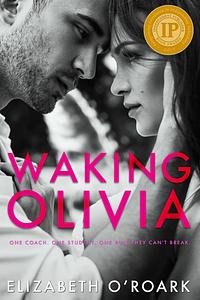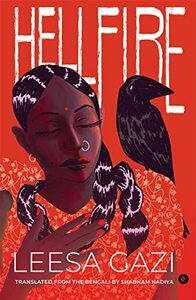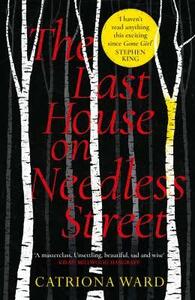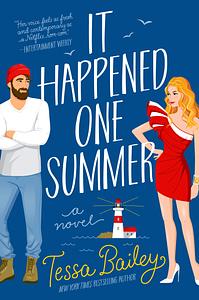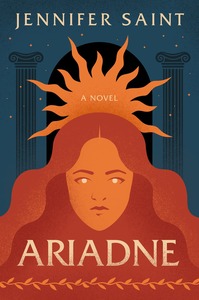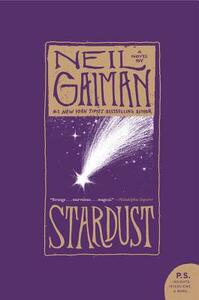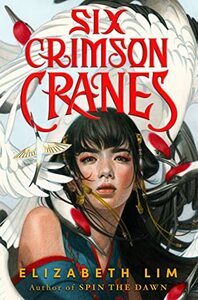You need to sign in or sign up before continuing.
Take a photo of a barcode or cover
whatsshwereading's Reviews (740)
dark
emotional
reflective
sad
medium-paced
Plot or Character Driven:
A mix
Strong character development:
N/A
Loveable characters:
Yes
Diverse cast of characters:
No
Flaws of characters a main focus:
Yes
challenging
dark
emotional
informative
reflective
tense
fast-paced
Plot or Character Driven:
A mix
Strong character development:
Yes
Loveable characters:
Complicated
Diverse cast of characters:
N/A
Flaws of characters a main focus:
Yes
In an assuming neighbourhood in Dhaka, Bangaldesh, lives an unassuming family – Mukhles Shaheb, the father, Farida Khanam, the mother, Lovely and Beauty – the daughters. Our story starts on Lovely’s fortieth birthday when she’s permitted (yes, you read that right) to step out of the house by herself. And in the next 24 hours, as the story unfolds, you discover, with horror, that there’s nothing banal about this seemingly domestic household.
Farida Khanam, a fearsome woman with rigid ideas of what motherhood is supposed to be, rules her house and the lives of her family with an iron fist. The father is a weak, non-entity, devoid of all agency; Lovely, the elder daughter is quiet and obedient; Beauty, the younger one, a spoilt brat, who finds ways to make her golden cage comfortable. There is ample display of toxic and abusive behavior (domestic help is always abused, the daughters are threatened, curses of death heaped upon them one minute and plied with sweet words and comforts the next). As you read, the annoyance at Lovely’s obedience, timidity gives way to a sense of foreboding, one that is fully realized in the final act. An action, I promise you, you won’t see coming.
On a side note, while I was reading reviews of this book, I came across one titled “What Happens to Women in a Matriarchy, and Other Secrets.”I strongly disagree. See, Hellfire is not about matriarchy. No. It’s about what happens when women internalize patriarchy and misogyny. It’s about how women are held to such stringent ideals, moral narratives, and placed on a pedestal that they lose all sense of self.
Hellfire is a tightly knit modern gothic horror. It’s a book that will make you think and think some more. It’s a book that will make you question the society, its morals, and ideals. Leesa Gazi has written a book for the ages and I am thankful that Shabnam Nadia’s effortless translation has made it accessible to people like me.
funny
informative
inspiring
reflective
fast-paced
Plot or Character Driven:
A mix
Strong character development:
N/A
Loveable characters:
Yes
Diverse cast of characters:
No
Flaws of characters a main focus:
Yes
What a marvellously, quirky feminist read! Though short, it packs quite a punch. Enjoyed reading the translator's note too.
challenging
dark
emotional
mysterious
sad
tense
fast-paced
Plot or Character Driven:
Plot
Strong character development:
N/A
Loveable characters:
N/A
Diverse cast of characters:
No
Flaws of characters a main focus:
Yes
I don't even know where to begin with this one. The last psychological thriller that messed with my head was Colleen Hoover's Verity. I never thought I'd ever read anything as deeply disturbing as that. Then this book happened and I am left questioning why I do this to myself. Am I masochistic?
I've read a fair amount of psychological thrillers, mind you. Some truly excellent ones (Confessions, Verity, Gone Girl, Unravelling Oliver) and a lot of truly terrible ones. The Last House on Needless Street is a category in itself. To call it disturbing would be an understatement and an oversimplification. What it is, is a well structured, multi-layered slow burn yet compulsive psychological horror. The kind that will creep unto you.
It's difficult to talk what the book is actually about without giving away spoilers. It's best you dive in blind. I called part of it 30% into the book (<i> you will too if you're familiar with the tropes of the genre </i>), was blindsided by some of the reveals, horrified in certain chapters and kinda-sorta satisfied with the way it all ended.
However this is not a book I will recommend to just about everyone. Please pick it up only and only if you're familiar with the genre. And if reading such books doesn't make you question the very existence of humanity.
I've read a fair amount of psychological thrillers, mind you. Some truly excellent ones (Confessions, Verity, Gone Girl, Unravelling Oliver) and a lot of truly terrible ones. The Last House on Needless Street is a category in itself. To call it disturbing would be an understatement and an oversimplification. What it is, is a well structured, multi-layered slow burn yet compulsive psychological horror. The kind that will creep unto you.
It's difficult to talk what the book is actually about without giving away spoilers. It's best you dive in blind. I called part of it 30% into the book (<i> you will too if you're familiar with the tropes of the genre </i>), was blindsided by some of the reveals, horrified in certain chapters and kinda-sorta satisfied with the way it all ended.
However this is not a book I will recommend to just about everyone. Please pick it up only and only if you're familiar with the genre. And if reading such books doesn't make you question the very existence of humanity.
Graphic: Animal cruelty, Child abuse, Child death
funny
lighthearted
relaxing
medium-paced
Plot or Character Driven:
A mix
Strong character development:
Yes
Loveable characters:
Yes
Diverse cast of characters:
No
Flaws of characters a main focus:
Yes
dark
emotional
informative
mysterious
reflective
sad
tense
medium-paced
Plot or Character Driven:
A mix
Strong character development:
Yes
Loveable characters:
Yes
Diverse cast of characters:
Yes
Flaws of characters a main focus:
N/A
Back in February, I was at a book fair. Just as we were leaving, a bronze pile of books caught my attention. Belonging by Umi Sinha, it said. I read the blurb - it wasn't terribly original or exciting, yet I picked it anyway. These days, my books are well researched and TBR planned, so, I am still wondering what made me pick a book by an author I'd never heard of. Perhaps, it was fate intervening. Perhaps, it wasn't me who chose the book, but the book that chose me. Little did I know then that this book was to become one of my favourite reads of 2021.
Belonging is a beautiful multi-generational saga of two families - Partridges and Langdons - connected by marriage, set against the backdrop of British Raj, who seemed to have been kissed by misfortune. The story is told from three perspectives - Cecily Partridge (in 1800s), her son Henry Langdon (late 1800s), and her granddaughter, Lila (early 1900s). Each story is touched by tragedy and rips your heart skein by skein.
To tell you anymore about the story would be spoiling it. So instead, I'll talk about the writing and what made me fall in love with a book that emotionally destroyed me. First, the writing is haunting, the prose simple yet affecting ( quite reminded me of Vikram Seth, though his work is nowhere as dark ); Sinha manages to create a portrait of times gone by so realistically, that I could smell the fresh air, feel the winter sun on my face. The nuances of language and culture are on point - Brits in India during 1800s and 1900s spoke and behaved a certain way. But what hit me the most was how Sinha managed to maintain the delicate balance of objectivity. Her story neither romanticizes nor villainizes British Raj. It shows how costly war is and that each side pays a heavy price. It tells you how greed, power, and the desire for vengeance can push a man to commit inhumane and monstrous acts.
Sinha uses multiple literary devices to tell her story - letters, diary entries, and third person narrative. To me, as a reader, this was an immersive experience and in no way detracted from reading. In fact, I loved it.
Belonging was published in 2015 and I am so surprised that I never even heard of it. It's a book that deserves to be read and lauded. I am certainly going to recommend it to everyone until they've ALL read it.
In short, Belonging is one of the finest historical fictions that I've read and whether you're a fan of this genre or not, I highly recommend it.
P.S: Naming a certain awful character Rebecca was a stroke of genius. I was so amused when I made the connection ( I don't know if it was intentional, but it's awesome )
Belonging is a beautiful multi-generational saga of two families - Partridges and Langdons - connected by marriage, set against the backdrop of British Raj, who seemed to have been kissed by misfortune. The story is told from three perspectives - Cecily Partridge (in 1800s), her son Henry Langdon (late 1800s), and her granddaughter, Lila (early 1900s). Each story is touched by tragedy and rips your heart skein by skein.
To tell you anymore about the story would be spoiling it. So instead, I'll talk about the writing and what made me fall in love with a book that emotionally destroyed me. First, the writing is haunting, the prose simple yet affecting ( quite reminded me of Vikram Seth, though his work is nowhere as dark ); Sinha manages to create a portrait of times gone by so realistically, that I could smell the fresh air, feel the winter sun on my face. The nuances of language and culture are on point - Brits in India during 1800s and 1900s spoke and behaved a certain way. But what hit me the most was how Sinha managed to maintain the delicate balance of objectivity. Her story neither romanticizes nor villainizes British Raj. It shows how costly war is and that each side pays a heavy price. It tells you how greed, power, and the desire for vengeance can push a man to commit inhumane and monstrous acts.
Sinha uses multiple literary devices to tell her story - letters, diary entries, and third person narrative. To me, as a reader, this was an immersive experience and in no way detracted from reading. In fact, I loved it.
Belonging was published in 2015 and I am so surprised that I never even heard of it. It's a book that deserves to be read and lauded. I am certainly going to recommend it to everyone until they've ALL read it.
In short, Belonging is one of the finest historical fictions that I've read and whether you're a fan of this genre or not, I highly recommend it.
P.S: Naming a certain awful character Rebecca was a stroke of genius. I was so amused when I made the connection ( I don't know if it was intentional, but it's awesome )
dark
sad
tense
slow-paced
Plot or Character Driven:
Character
Strong character development:
N/A
Loveable characters:
No
Diverse cast of characters:
N/A
Flaws of characters a main focus:
Yes
A Japanese translation with the title Touring the Land of the Dead was too much for me to resist. Without really reading the blurb or anything much about either the book or the author, I bought it. Imagine my surprise when it turned out that the titular story was but a novella! Plus, an accompanying novella - Ninety Nine Kisses, was included ( perhaps to justify the steep cost of the book?)
So here goes:
Touring the Land of the Dead
This is a story that deals with familial (emotional and mental) abuse and repressed trauma through memories. The story is dismal, raw, and almost painful to read. In the hindsight, I would have probably avoided the book had I known how brutally abuse is explored ( considering I wasn't in the right headspace for reading something like this ) Is there redemption towards the end, I am not certain. It at least seemed like the protagonist was taking a step in the right direction but, I am not sure.
Ninety Nine Kisses
Okay, holy effing hell, what was this? Just, what? This story was supposed to be inspired by The Makioka Sisters, which I haven't read and now, I don't want to. It's a story about 4 sisters living with their Mum - so far, so good. And then it got real weird, real fast. This story, seemed to me, a sort of modern, edgy, incestuous and downright creepy subversion of Little Women ( and not in a good way, mind you ) I truly didn't care for the overtly graphic sexual tones and couldn't wait for the book to end.
Europa Editions' TtLotD ought to have come with TWs. I am most upset that it didn't. I am also a little peeved about a little typo - in the blurb for Ninety Nine Kisses, it says ".......captivating tail of siblings". For a paperback that's as pricey as this, I think they could've afforded to be a bit more careful?
So here goes:
Touring the Land of the Dead
This is a story that deals with familial (emotional and mental) abuse and repressed trauma through memories. The story is dismal, raw, and almost painful to read. In the hindsight, I would have probably avoided the book had I known how brutally abuse is explored ( considering I wasn't in the right headspace for reading something like this ) Is there redemption towards the end, I am not certain. It at least seemed like the protagonist was taking a step in the right direction but, I am not sure.
Ninety Nine Kisses
Okay, holy effing hell, what was this? Just, what? This story was supposed to be inspired by The Makioka Sisters, which I haven't read and now, I don't want to. It's a story about 4 sisters living with their Mum - so far, so good. And then it got real weird, real fast. This story, seemed to me, a sort of modern, edgy, incestuous and downright creepy subversion of Little Women ( and not in a good way, mind you ) I truly didn't care for the overtly graphic sexual tones and couldn't wait for the book to end.
Europa Editions' TtLotD ought to have come with TWs. I am most upset that it didn't. I am also a little peeved about a little typo - in the blurb for Ninety Nine Kisses, it says ".......captivating tail of siblings". For a paperback that's as pricey as this, I think they could've afforded to be a bit more careful?
Graphic: Emotional abuse, Incest, Physical abuse, Toxic relationship, Sexual harassment
slow-paced
Plot or Character Driven:
A mix
Strong character development:
No
Loveable characters:
No
Diverse cast of characters:
N/A
Flaws of characters a main focus:
Yes
I should know by now that any book that claims to be " the brilliant feminist debut book that everyone is talking about " even before it hits the shelves, will be anything but a brilliant feminist debut.
I love Greek myths. Always have. I love feminist retellings of myths even more. Madeline Miller's Circe was a revelation. So when I saw that Jennifer Saint decided to give a voice to Ariadne ( who's little more than a footnote in the original tales ), I was intrigued; skeptical but intrigued. How do you flesh out an entire novel around a young woman who's role in the story of Theseus and Minotaur was but a flash in the pan? Turns out, you cannot. Or at least Saint, could not.
This book, is chapters, upon chapters of Ariadne feeling sorry for herself. For her mother. For her sister Phaedra. Then some for herself. And the chapters where Ariadne and Phaedra are not busy feeling sorry for Ariadne, they are busy hating on Theseus. Why not just call the book The Theseus Hate Club and be done with it? ( I am not taking Theseus' side here. I am sure, like rest of them heroes, he was vainglorious and insufferable but for a "feminist" novel about Ariadne, the book places a lot of emphasis on how despicable Theseus was and not enough on Ariadne's rise to? Umm, I don't even know. Myths are obscure there )
Then there was the entire timeline of the Heroes. I was quite taken aback when Perseus is introduced. I am no expert, but I am certain that he was much before Hercules' time? Hercules who's Theseus' mentor? The last couple of chapters made no sense, none whatsoever.
All I read in this book was a recounting of Greek myths from the time of Theseus and that it was the lot of women to suffer. See, here's the thing I like about Greek myths - women are no damsels in distresses. Some of them were shown to be power hungry, vengeful, crafty, sly, promiscuous; but Saint, in taking all this away from Pasipae and Phaedra turns them into stereotypes the classics are so fond of - women at mercies of men and Gods. Women who suffer because society is cruel. And that to me was the worst offence of this book.
Ariadne is no Circe. Thank you, next?
I love Greek myths. Always have. I love feminist retellings of myths even more. Madeline Miller's Circe was a revelation. So when I saw that Jennifer Saint decided to give a voice to Ariadne ( who's little more than a footnote in the original tales ), I was intrigued; skeptical but intrigued. How do you flesh out an entire novel around a young woman who's role in the story of Theseus and Minotaur was but a flash in the pan? Turns out, you cannot. Or at least Saint, could not.
This book, is chapters, upon chapters of Ariadne feeling sorry for herself. For her mother. For her sister Phaedra. Then some for herself. And the chapters where Ariadne and Phaedra are not busy feeling sorry for Ariadne, they are busy hating on Theseus. Why not just call the book The Theseus Hate Club and be done with it? ( I am not taking Theseus' side here. I am sure, like rest of them heroes, he was vainglorious and insufferable but for a "feminist" novel about Ariadne, the book places a lot of emphasis on how despicable Theseus was and not enough on Ariadne's rise to? Umm, I don't even know. Myths are obscure there )
Then there was the entire timeline of the Heroes. I was quite taken aback when Perseus is introduced. I am no expert, but I am certain that he was much before Hercules' time? Hercules who's Theseus' mentor? The last couple of chapters made no sense, none whatsoever.
All I read in this book was a recounting of Greek myths from the time of Theseus and that it was the lot of women to suffer. See, here's the thing I like about Greek myths - women are no damsels in distresses. Some of them were shown to be power hungry, vengeful, crafty, sly, promiscuous; but Saint, in taking all this away from Pasipae and Phaedra turns them into stereotypes the classics are so fond of - women at mercies of men and Gods. Women who suffer because society is cruel. And that to me was the worst offence of this book.
Ariadne is no Circe. Thank you, next?
adventurous
funny
lighthearted
fast-paced
Plot or Character Driven:
Plot
Strong character development:
N/A
Loveable characters:
Yes
Diverse cast of characters:
Yes
Flaws of characters a main focus:
N/A
Listened to the BBC full-cast dramatization and was thoroughly charmed. Stardust continues to be my second fav Gaiman book (first place belongs and will always belong to Coraline)
adventurous
lighthearted
relaxing
fast-paced
Plot or Character Driven:
A mix
Strong character development:
Yes
Loveable characters:
Yes
Diverse cast of characters:
Yes
Flaws of characters a main focus:
N/A
Elizabeth Lim's Six Crimson Cranes, set in imperial Asia, is a brilliant subversion of Grimm's Six Swans. What Lim basically did was take a bunch of European fairytales, spun them on their heads, added a generous dose of Chinese and Japanese folklores, and brushed them over with a feminist vibe. The result is a satisfactory and engaging YA fantasy.
Shiori is a wonderful protagonist - she's a teenager, which means she's bratty, thoughtless, impetuous, given to sulks and tantrums, doing the exact thing she's asked not to but she isn't insufferable. She isn't all "oh no, why am I the chosen one", she isn't "I'm special, you don't say?". She's aware of who she is and is focused on the fact that she has a kingdom to save. Of course, there's a love interest; potentially two love interests, but romance is low-key and does not impair judgement.
Lim's world is beautiful yet it felt contemporary? I know it's supposed to imperial China/Japan, but the way the characters spoke, the mild allusions to dressing and etiquette ( and Shiori saying things like "this too shall pass" or "pain doesn't get easier. You just have to get stronger" ) didn't really give such impression.
Six Crimson Cranes is well-written YA fantasy adventure. If cursed princesses, doomed kingdoms, curses, demons and dragons are your thing, you definitely won't go wrong with this one.
Shiori is a wonderful protagonist - she's a teenager, which means she's bratty, thoughtless, impetuous, given to sulks and tantrums, doing the exact thing she's asked not to but she isn't insufferable. She isn't all "oh no, why am I the chosen one", she isn't "I'm special, you don't say?". She's aware of who she is and is focused on the fact that she has a kingdom to save. Of course, there's a love interest; potentially two love interests, but romance is low-key and does not impair judgement.
Lim's world is beautiful yet it felt contemporary? I know it's supposed to imperial China/Japan, but the way the characters spoke, the mild allusions to dressing and etiquette ( and Shiori saying things like "this too shall pass" or "pain doesn't get easier. You just have to get stronger" ) didn't really give such impression.
Six Crimson Cranes is well-written YA fantasy adventure. If cursed princesses, doomed kingdoms, curses, demons and dragons are your thing, you definitely won't go wrong with this one.
